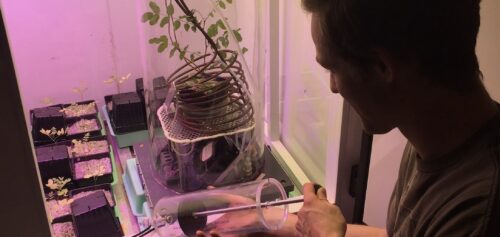 Professor Deren Eaton wins NSF Career Award
Professor Deren Eaton wins NSF Career Award
Deren Eaton, Ph.D., assistant professor of Ecology, Evolution, and Environmental Biology, has been awarded the National Science Foundation’s (NSF) prestigious Faculty Early Career Development (CAREER) award, the NSF’s highest honor awarded to early career faculty. The five-year $956K grant will support his proposal “Linking Phylogenetic Inference at Genome-wide and Local Genealogical Scales”.
Eaton’s research combines computational genomics and bioinformatics with field-based studies of diverse and hybridizing plant species to examine the evolutionary consequences of hybridization in shaping the history of plant diversification. With the NSF grant, Eaton’s lab will produce new genomic data sets, and develop new software tools, to better understand how variation within and among genomes is affected by historical hybridization.
“The size, complexity and variation among plant genomes presents a major challenge for comparative genomics, for which most tools have been designed to examine variation in human genomes, which are really not that variable,” says Eaton, who is also an affiliate member of Columbia’s Data Science Institute. “Now that we can more easily assemble complete plant genomes, we can begin to investigate evolutionary relationships not only among populations and species, but also in terms of how such patterns vary across regions of their genomes. The extent and speed with which plant genomes rearrange affects patterns of genetic linkage, which in turn can bias many phylogenetic inference methods. By developing new methods that accommodate variable genome structure and linkage we can establish better null hypotheses against which to detect interesting patterns, such as genomic signatures of hybridization.”
Eaton’s project will produce new software tools for inferring the evolutionary history of organisms from genomic data, as well as new didactic tools that will form the basis of a new course at Columbia focused on phylogenetic algorithms and methods. This research fits into a broader theme of Eaton’s lab towards understanding the drivers of diversification in global hotspots of plant diversity. “A major outcome of this research will be an improved understanding of the extent of hybridization across the tree of life, which is fundamental to our understanding of biodiversity and evolution, but also has important implications for conservation”, says Eaton. His lab will apply their new methods to investigate gene flow among endemic plant species in alpine regions of the Tibetan plateau that have historically been highly isolated, but now come into contact as a result of human development, land-use transformation, and climate change.














